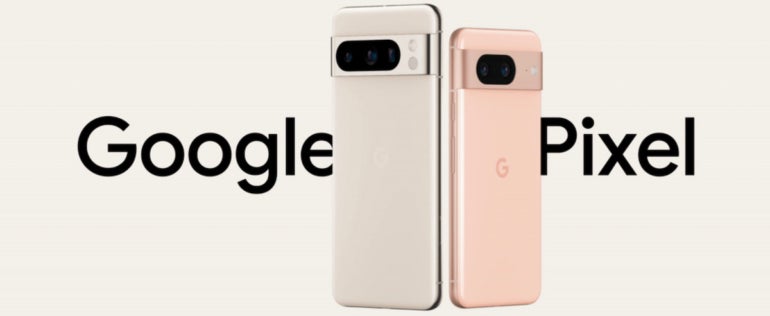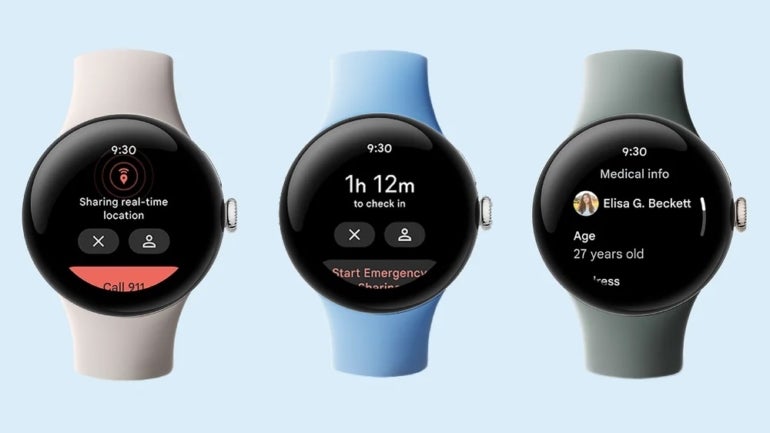
Google announced the release date and prices of the Pixel 8 and Pixel 8 Pro phones and the Pixel Watch 2 during its Made By Google keynote presentation today. Generative AI natural language capabilities for Assistant with Bard were also announced.
The Pixel 8 and Pixel 8 Pro will be available on October 12. The Pixel 8 starts at $699. The Pixel 8 Pro starts at $999.
Google’s second-generation Pixel Watch will be available for purchase on October 12 for $349.99 for Bluetooth/Wi-Fi or $399 for 4G LTE.
Jump to:
The Pixel 8 and Pixel 8 Pro (Figure A) will ship with the Android 14 operating system. Google expanded Pixel 8 and Pixel 8 Pro support to seven years. The Pixel 8 will have 8GB of RAM, while the Pixel 8 Pro has 12GB.
Figure A
Pixel 8 boasts the 6.2″ Actua display for 42% increased brightness compared to Pixel 7. Pixel 8 Pro uses the 6.7″ Super Actua Display for maximum brightness and realism.
Pixel 8 Pro includes a new temperature sensor. For now, the temperature sensor is useful for checking whether a surface is hot enough to start cooking; Google has submitted an application to the FDA to allow it to be certified for use in checking body temperature as well.
Both versions of the Pixel 8 run on the Google Tensor G3 chipset, which enables Pixel 8’s AI experiences by utilizing the following:
The Google Tensor G3 runs twice as many machine learning models on-device compared to the Pixel 6. Google Tensor G3 can run machine learning models concurrently, enabling the new camera capabilities. Pixel 8 can send voice-to-text messages in multiple languages at the same time, and can read web pages out loud. Google Speech enables Call Assist, which removes background noise, helps navigate phone trees or screens spam calls. The Tensor chip enables improvements in video quality, including low-light video performance.
SEE: Google’s Vertex AI platform enables a variety of uses for the PaLM large language model (TechRepublic)
Google Pixel 8 Pro can run more generative AI processes on-device compared to Pixel 7; this helps with image editing when using Magic Eraser, which can crop unwanted elements from photos. An upcoming update to Recorder will have on-device generative AI in Pixel 8 Pro for summaries of the recordings that recap the highlights.
In the coming months, Pixel 8 Pro’s on-device large language model will provide smart replies in Gboard. Pixel 8 Pro will have a custom generative AI image model on-device, which will enable Zoom Enhance, a generative function that invents details on distant images when you zoom in. All of these features are enabled by Tensor G3 and will either ship with Pixel 8 Pro or come in a December feature drop on Pixel 8 Pro.
The Titan M2 security chip provides security enhancements by storing and verifying security keys. The chip hardware is made to be tamper-resistant as well.
Pixel Buds, the earbuds that pair with Google Pixel phones, are getting enhancements that will start to roll out as software updates today.
Google Pixel 8 and Pixel 8 Pro will be available in Austria, Australia, Belgium, Canada, Denmark, Ireland, France, Germany, Italy, Japan, Netherlands, Norway, Portugal, Singapore, Spain, Sweden, Switzerland, Taiwan, U.K. and U.S.
Google Pixel 8 and Pixel 8 Pro compete in the smartphone space primarily with the Samsung Galaxy S23 and Apple’s iPhone 15.
Google Pixel Watch 2 runs on a Quad Core CPU and has improved battery life: 24 hours of battery life and a 12-hour charge in 30 minutes. Pixel Watch 2 runs on Wear OS 4.
The Google Pixel Watch 2 has a variety of health-tracking features (Figure B), including a multi-path heart rate sensor, a skin temperature sensor and an electro-dermal activity sensor, which detects stress and prompts stress management techniques.
Figure B

Google Pixel Watch 2 has a low-profile design similar to the first-generation Pixel Watch, with a recycled aluminum housing, Fitbit CEO and cofounder James Park pointed out during the Made by Google presentation.
Park also highlighted generative AI features on the Fitbit app; it will be able to answer natural language questions about the activities the app records and generate charts showing relevant data. The generative AI capabilities will come to trusted testers in the Fitbit Lab program early next year, with priority access for Pixel phone owners.
The Google Pixel Watch 2 runs on the Snapdragon W5 Gen 1 Wearable Platform from Qualcomm. The specs of that Snapdragon platform are:
Google Pixel Watch 2 will be available in Australia, Austria, Belgium, Canada, Denmark, France, Germany, Ireland, Italy, Netherlands, Norway, Portugal, Spain, Sweden, Switzerland, Japan, Taiwan, U.K. and U.S.
The two main alternatives to the Google Pixel Watch 2 are the Apple Watch Series 9 and the Samsung Galaxy Watch 6.
Sissie Hsiao, vice president and general manager of Google Assistant and Bard, announced Google Assistant is getting a generative AI enhancement. Google Assistant with Bard can interpret and respond to text, voice or images. It can scan emails for the most important information and respond to natural language questions about the emails. Hsiao demonstrated asking Google Assistant with Bard to create a social media post based on an image.
Google Assistant with Bard will soon be in beta testing with select users and will be generally available on Android or iOS mobile devices in the next few months.
In order to smooth out future advanced wearable launches, Qualcomm and Google are continuing their partnership on a RISC-V Snapdragon Wearable platform, Qualcomm announced in a press release. RISC-V is an open-source software architecture for processor innovation intended to make it easier for OEMs to reduce time to market when launching advanced smartwatches.
“Qualcomm Technologies have been a pillar of the Wear OS ecosystem, providing high performance, low power systems for many of our OEM partners,” said Bjorn Kilburn, general manager of Wear OS by Google, in a Qualcomm press release. “We are excited to extend our work with Qualcomm Technologies and bring a RISC-V wearable solution to market.”